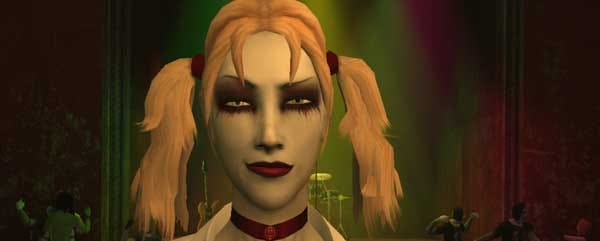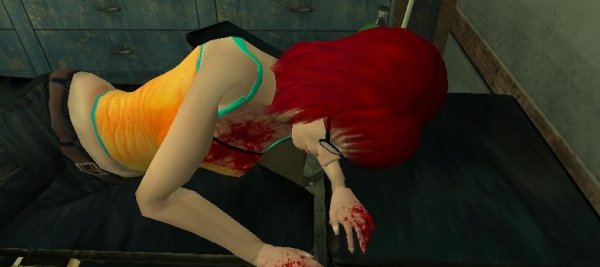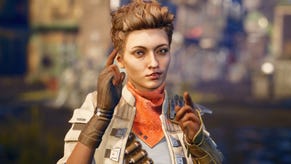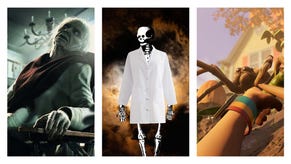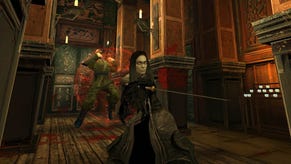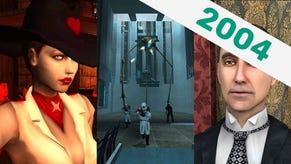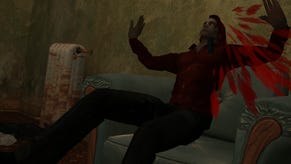Interview Without A Vampire: Bloodlines' B Mitsoda
A while back I posted about the tragedy of games like Vampire: The Masquerade - Bloodlines. Following that one of the original Troika team, writer Brian Mitsoda, got in touch to talk about the project. A veteran of Troika and RPG-devs Obsidian, he's had plenty of experience in the words that make up videogames. What follows is a discussion of Bloodlines, Troika, dialogue, character design, and inaccurate porn geographies.
RPS: Let's start with a quick breakdown of your professional career: what have you worked on, and what did you contribute to those games?
Mitsoda: Real quick-like and to the best of my memory, I started in QA at Interplay way, way back, testing a couple of games that no one remembers and a couple they do, like Icewind Dale. Then I got promoted to designer/writer at Black Isle and worked with a bunch of great people on a game called Black Isle’s TORN (yes, it was all caps – thanks, marketing) which was never released due to some good ideas being married to bad tech. ONE YEAR LATER… joined Troika on Vampire the Masquerade: Bloodlines. I then spent three years working at Obsidian on one fantastic cancelled project and a version of Alpha Protocol.
RPS: Let's talk about Troika: how did you become involved in the Bloodlines project?
Mitsoda: Bloodlines was already into production when I joined Troika. The Half-Life 2 engine wasn’t finished. There was some preliminary design and some levels built, but most of the work that was there was revamped and, for the most part, the design was started from scratch. Quite a few people were new to the company. This basically meant we had to hit the floor sprinting and juggling plates. It was all very exciting, fueled in some part by equal parts enthusiasm/naiveté on my part.
RPS: Did the scope of the game just seem too big to you?
Mitsoda: Yes. It made me coin the phrase “kitchen sink design” – which isn’t that an impressive phrase I know, but I was too busy turning out stuff for the game. Kitchen sink design just means your game has everything AND the kitchen sink, and we literally did have kitchen sinks in that game. When a game tries to do everything, it will most likely fail at most of them.
A lot of this is due to designers (including myself) shooting too high within the scope. Sometimes overpromising features to the publisher causes it. Adapting one type of gameplay for a different interface – like sneaking and melee, for instance, which pose a lot different animation, design, and AI challenges in an FPS – and not realizing how long it takes to prototype and refine those systems, can cause problems. A simple refusal to cut or lock content generation is also a culprit in bloated scope. I think Bloodlines suffered from all of these, but despite its flaws, I think we managed to do some things exceedingly well.
Nowadays, if I have any say over it, I eliminate anything that I think can’t be finished in the estimated time to completion. Designers should cut not only to spend time on polish, but because it ends up creating a lot of work for everyone else on the team too. Unfortunately, it is my experience that too many people in the game industry cannot learn this lesson. It’s especially bad on RPGs since publishers and fans have this expectation that the game should be fifty to a million hours long, which is almost impossible to polish.
RPS: How did you go about creating the plot and dialog? Can you describe the overall process? There's a number of writers credited, plus the design team, what influence did you have in that wider creative circle?
Mitsoda: The basic plot was kind of there – there’s a new prince in town, there’s a group of anarchs that are pissed, ties to Gehenna event, and Jack and the sarcophagus being a major story point. The designers (about five people) discussed some ways to tie everything into the hubs and levels. With the broader elements agreed upon, we had a lot of control over our sections of the game. Keep in mind, it was a small team doing everything – two writer/designers, one modeler/senior designer, and two owners/producers/designers. With just a few people overseeing every aspect, it doesn’t take as long to reach a consensus or keep plot straight.
Over time, I became primarily tasked with writing the majority of the characters and dialogue, and that helped with consistency. I probably had to argue points a few times, but because of time constraints or faith in my abilities, I was given a lot of freedom with characters and their quests.
RPS: What were the best and worst things about that game from a writing standpoint?
Mitsoda: The Best – Freedom to do what I wanted with the writing. Not having to sanitize the language or content, which meant I got to work with some more mature elements outside of casually slipping f-bombs into the script. Working with Margaret Tang, an amazing voice director who did us solids left and right to get the right voices for the parts. Writing comedy, tragedy, drama, and a Frankenstein bit all in the same game. Getting to rewrite a few characters (like Damsel) after I felt my first draft was weak. The radio script. Some of the insignificant bits like computer text or spam emails, which were great fun after spending a day setting up cameras or tracking down a scripting bug.
The Worst – Scope. Pushing myself too hard to do too much, burning me out for a couple of months after the project was over. Writing a project like Bloodlines and realizing that, for the rest of your career, you probably won’t get to write anything like Bloodlines.
RPS: How comfortable was the team with the adult themes in the game?
Mitsoda: I don't think there were any problems. Most game developers aren't terribly sensitive to "salty" language or mature subject matter. If anything, you have to watch out or it quickly develops into immature.
RPS: Was there ever a moment when you thought that porn dungeons might have been too risky?
Mitsoda: Not really. Wasn't there a zebra in there? If anything, it was inaccurate - porn is shot in the Valley, not Hollywood.
RPS: Any research needed in that area?
Mitsoda: Not really, but I did run around in a cape for a few weeks to get the vampire thing down.
RPS: The character design in Bloodlines is what really stands out for me, can you elucidate the process of creating some of these characters a little?
Mitsoda: Sure. A lot of times they're born out of necessity. You need a character to pose a problem or give out a quest or be a barrier of some kind. I don't like to make the NPC outright say "I need you to do X, then I'll give you Y" because I see it all the time in games and it shows the writer's hand - it makes the character into an automated quest kiosk. I like the characters to come off like people actually do - they don't say "hi" when strangers come knocking, they say "who the hell are you?" or they're expecting you and know more then they let on, or they don't care. I don't like my NPCs to be standing around as if their lives begin when the character starts talking to them and end when the player leaves. Characters are the protagonists of their own game, from their perspective.
Major characters that the player speaks to multiple times need to show progression based on your previous interactions or actions you've taken in the world. One-off characters that you talk to once, need to have hooks or personality traits that make them immediately fascinating, or they feel like just another quest item depository. It's nothing but putting a little extra effort into it - thinking about who the character is, what they want, what they think of the player, why they're standing around, and how they're sizing up or trying to take advantage of the player. I generally find the character's voice out loud to get an understanding of their speech pattern and tone. If I've got it, then the dialogue just comes naturally after that.
RPS: Did the malkavian player character pose any special problems for you?
Mitsoda: I generally did it last, when there wasn't a whole lot of time left. So between lack of sleep, being overworked, and possessing an unhealthy state-of-mind, the conditions were ideal for writing the Malkavians. The one thing I wanted to do with them is illustrate madness without it being completely Looney Tunes. It's too easy to play crazy for laughs.
RPS: Do you feel that good writing in games gets overlooked, while bad writing gets trashed?
Mitsoda: I feel like bad writing is tolerated, while mediocre writing gets spooned. I don’t think good games necessarily need good writing, but I would really enjoy it if games that sell their story first and foremost did a better job of delivering. Certain studios and writers, I think, get a pass (and work) no matter what they turn out, while a few veterans (like Tim Schafer) continue to turn out excellent work. I think if critics are going to focus on a game’s writing, they should analyze not only the marriage of the narrative to the gameplay, but set some higher standards for what they expect from characters, plot, and dialogue.
A good scene, a good line, and/or a decent character do not make a game’s story great. Bad writing is bad writing – it might not matter if the game is fun, but don’t score the story higher because the game mechanics were tight or the setting was novel. Ultimately, the writing really isn’t that key to a fantastic game, but for those that do make it a crucial part of their game and hype it as such, those are the games the gaming press should be a lot more critical of. And for those that identify themselves as game writers, critics and fans should absolutely hold feet to flames ad infinitum, myself included.
RPS: Why do games journalists always seem to end up complaining about voice acting in games?
Mitsoda: It generally tends to be sub-SciFi Channel original, intrusive, or comfortably mundane.
RPS: So is it overlooked by developers, or is it just too hard to do well?
Mitsoda: It’s not difficult, I don’t think, but it requires the right people and a bit of forethought. I’ve always found it easier to put together, because I’ve got some screenwriting and acting background. Essentially, what you need is:
-A writer that knows how to write spoken dialogue for actors, and knows how they want the voice and character mannerisms to sound before the script goes to the studio.
-A voice director that wants to work with the writers in getting them the voices and direction they want.
-The right actors for the parts, given enough context and direction to bring the character to life without telling them “say it like this” after every take.
Too often dialogue writers have long, unwieldy, cluttered dialogue that would sound fine if it was being read, but sounds preposterous and maybe even stupid if being read dramatically. I know for a fact that a lot of actors can’t stand doing games because most of the stuff they have to read is:
“[Urgent and relieved]Lo, it is very fortuitous that you have arrived in Gremalkenvale [Gray-molk-in-vail], in the most dire time of our cataclysmic confrontation with the Shadoouins [Shadoo-we-ins]! [Surprised, chewing on waffles]I see you are bearing the sword of Icthmhaloaxen [Bos-ton], the Moss Knight of the Fsxirtuinox [Fsxirtuinox] Caverns, which means that [ominous and loud and a little obsequious with a hint of Gary Coleman] you are the chosen hero prophesized to defeat the evil demon king, [Swahili accent, as Grendar is learned in the ways of the Bark people] Gflxxx4mrazormkkxzzz!sss and his grim followers with your trusty friends, [need a version of this line to cover all the companions].”
That’s how one line of some game dialogue (not mine) looks – you try doing ten pages of that, three takes apiece, with a roomful of producers and writers all adding their own clever notes on how it could be read better. That is if the writer is there or the actor has been given anything in advance. It all comes down to the people involved, but a good writing lead should be able to get the dialogue up to snuff, get a competent director and actors, and be sure the recording process goes smoothly.
RPS: How did you feel about the game after launch?
Mitsoda: Well, I was proud of the work that the team and I did. On the other hand, I knew it could have used a few more weeks of polish. Couple the state of the release with the fact that we were launching against Halo, Metal Gear Solid, and Half-Life sequels, it felt one step up from being sold at a yard sale.
RPS: Were you still at Troika for the closure?
Mitsoda: Yup, and then some. We tried to get some other projects going, including creating a prototype that was fun and put together in almost no time.
RPS: How did you feel about that?
Mitsoda: The game industry constantly gives you reasons to rethink your career decisions. That said, I’m still glad I worked on Bloodlines.
RPS: How do you feel about the community patches that followed to fix Vampire up?
Mitsoda: I'm always surprised when I see new patches or content for the game, but I'm glad there's still interest in it.
RPS: Do you have any residual bitterness about the game shipping unfinished?
Mitsoda: Whether you're creating books, films, movies, anything, there's probably something the creators want to change about it. The technical problems should have been fixed, no question. I suppose if I'm bitter about anything, it's that even if our initial sales numbers weren't that solid, I know the game has sold well over the years through digital distribution, and it illustrates just how short-sighted this industry can be. I'd love to know what the numbers are these days to find out just how successful the game was over time. Some residuals would be nice too.
RPS: Yes, that would be interesting. Thanks.
Bloodlines is quite a few hours of excellence, once patched up. You can get it for cheap in boxed versions all over the place, or on Steam for £15/$20. And yeah, the money from your purchase won't get back to the original team.
